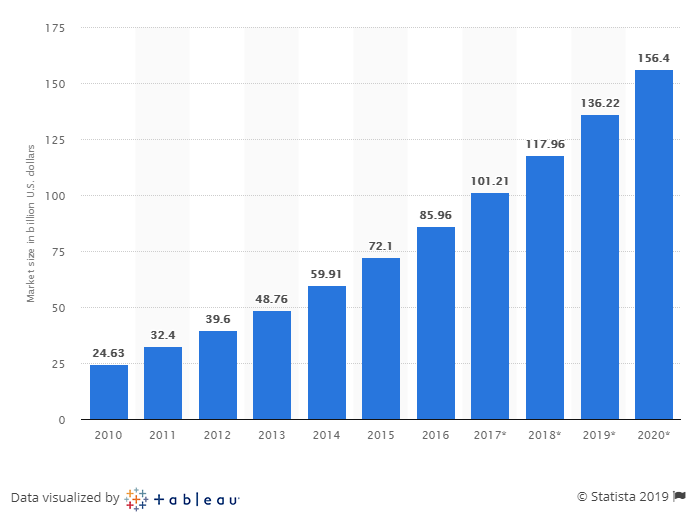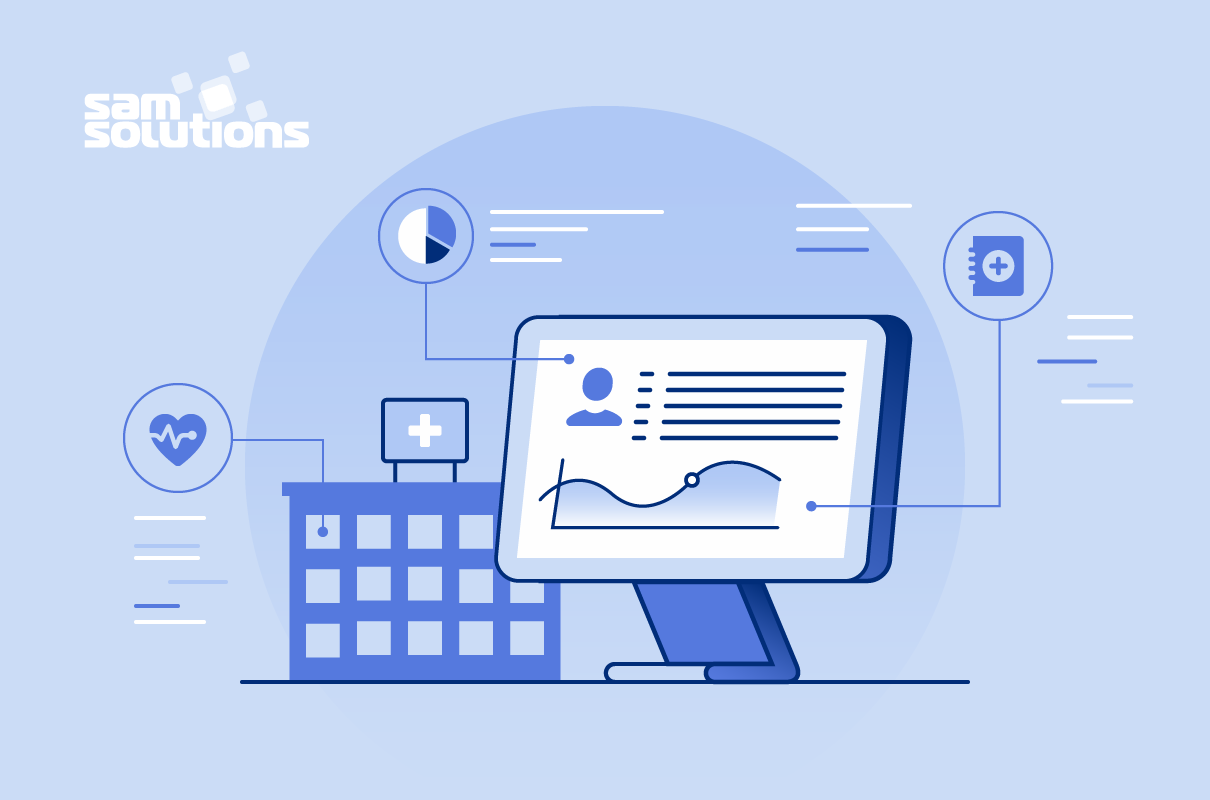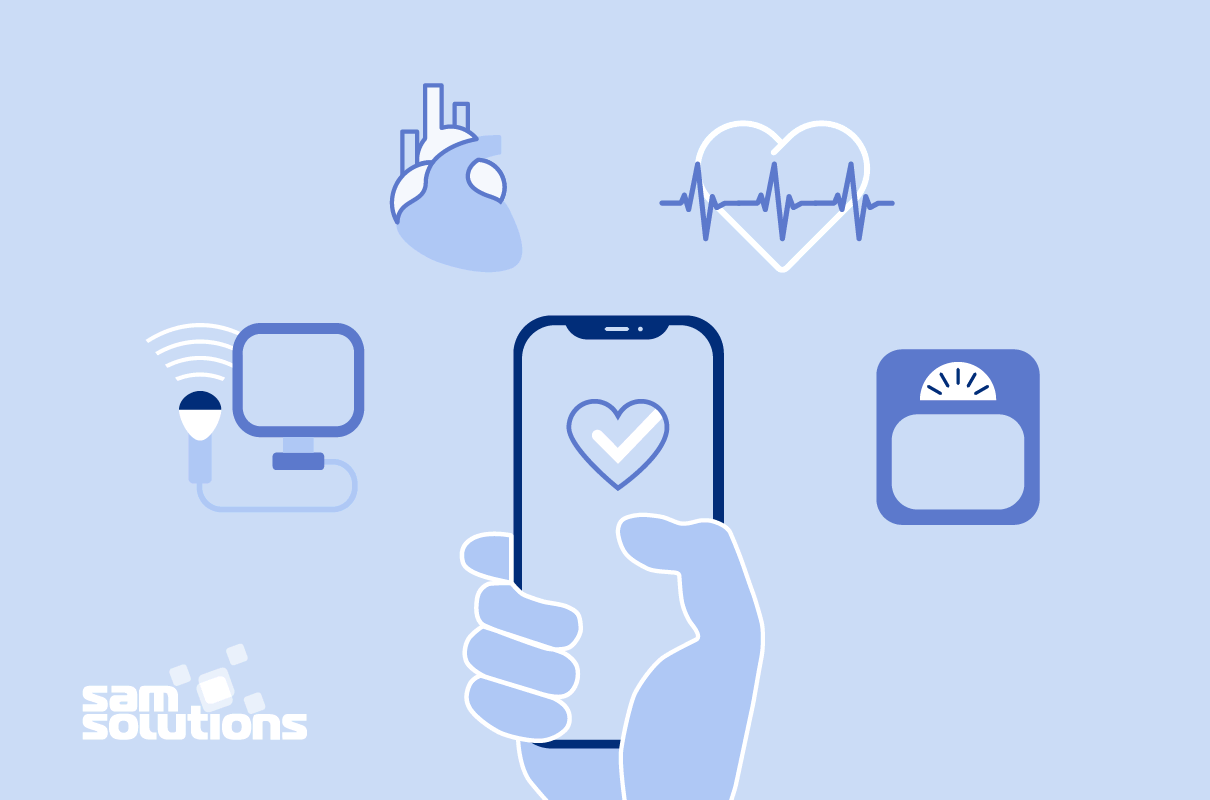To effectively run a hospital today, having an expert staff is not enough — there’s also a demand for the high quality of service. A great hospital management solution is a must for any modern hospital, as it provides great assistance to doctors, allowing them to focus on their patients instead of filling out documents and performing other mundane tasks.
Leverage SaM Solutions’ decades-long expertise in IT to develop high-quality custom software for your business.
What Is Hospital Management Software?
Managing the operations of a medical organization is a challenge for employees since they should process loads of data and handle much paperwork. The best solution that can be found in this situation is implementing hospital management software (HMS).
A web-based or a cloud hospital management system is a specialized software system that integrates information from all departments of a hospital and automates multiple processes within an organization.
An HMS should include information categories including:
- Doctors — schedules and emergency numbers
- Patients — medical history and personal data
- Staff — contact numbers and professional details
- Occupancy — the availability of rooms
- Laboratory — referrals for tests and delivery of results
- Supplies — inventory of the stock of medications, instruments and other supplies
- Billing — calculation of patients’ expenses
- Insurance — patients’ details for insurance companies
- Statistical reports — analysis of all the data in the system and the compilation of various reports
- Telemedicine — services for providing distant medical monitoring and consultations
An HMS considers the needs of the management board, staff and patients, simplifying processes and improving the quality of services.
Management software is valuable for doctors and nurses: they get access to a single database of patient information, can check the history of the patient’s condition and get test results in a fast and efficient way, or can make changes in the data on the patient card. This makes analysis and decision-making faster, more efficient and more accurate.
Hospital administration also benefits from such systems. They are able to analyze doctor schedules and calculate how many hours of work were put in, account for peak hours better, reduce the time spent on equipment maintenance and the potential loss associated with it, and draw insights on the profitability of various services.
An HMS assists the marketing department in tracking the effectiveness of their campaigns, while patients get consultations and timely treatment without having to wait in line.
Moving from outdated systems to modern ones could be a pricey decision, but, if applied correctly, it will result in greater efficiency, faster delivery, and higher-quality care for patients. The ROI of these systems comes first and foremost from the shortening of appointment wait times and the increased quality of service.
Basic Healthcare Management Software Features

A hospital automation system aims to bring efficiencies into the medical business, and therefore, it must penetrate every stage of the healthcare process. If you plan to create an HMS, the following features will likely be the backbone of your operations:
Registration
The system should automate the procedure of call processing and filling out medical records. This will speed up patient registration and admission. Moreover, patients should have an opportunity to book an appointment at a convenient time online or via an application. Registration also allows seeing the number of patients visiting each doctor in the hospital.
Appointment Management
Both doctors and patients should have access to their personal accounts so that they could monitor their appointment details and change them, if necessary. The system should send text or voice messages, emails or push notifications to patients to remind of their upcoming appointments.
Financial Automation
The payment amount for each patient should be automatically calculated in the program for all services chosen in one spot when making an appointment. It is assumed that the payment amount is already known when the patient asks for certain services at reception. The system should automatically track the patients’ payment history that includes every financial interaction. The software can also enable variable pricing for first consultations and follow-up visits.
Accountants can also use this feature to allocate funding to every department and monitor purchases in the app. Access can be given to specific staff members or groups.
Inventory Management
The software should monitor the materials and calculate automatically how much of every item is left in stock, showing it in the clinical management app. This will allocate the materials needed for procedures and account for every item. The software can also monitor the expiration dates of drugs in store.
Laboratory Management
The results of medical tests and exams should be sent to doctors and patients as soon as they are ready, via email or another digital channel. In cases when there are results outside of the normal range, the system must send immediate notifications. A hospital management system should also allow accessing the lab results on any device if the user has permission to access it.
Data Analysis and Reports
You can achieve efficiencies on the basis of insightful analysis and metric measurements. An HMS should be able to analyze data, compile reports and dashboards.
Customer Relationship Management
This feature is especially relevant for patients with chronic diseases who frequently visit hospitals. The system can create personal treatment calendars and other convenient features to provide continuous care.
A mobile application should be an inevitable part of a management system. While on the patient side it could be a simple calendar with available dates highlighted, on the hospital side, it could also show the availability of the doctors, other appointments and the availability of special medical equipment. A hospital mobile app can allow for greater flexibility and convenience.
Why Use Cloud-Based Hospital Management System?
The success of the cloud services is obvious today, and this growth is expected to continue in future years, according to Statista.
Size of the cloud computing and hosting market worldwide from 2010 to 2020 (in billion U.S. dollars)

Source: Statista
The healthcare industry benefits from multiple cloud options. Health IT professionals get the freedom to choose the best packages for their organization, based on their regulatory compliance needs.
The cloud offers such a level of reliability and connectivity that no other technology can provide. More and more healthcare companies are looking at the cloud as a solution that can host their media information, including images, photographs, scans, etc. Also, security issues that are a common reason not to move the infrastructure to a cloud are easily avoided if proper measures such as encryption and compliance with common security certificates are undertaken.
Image sharing, analytics and the virtual desktop infrastructure that the cloud offers are the more widespread features used by both management and the staff of hospitals alike. These features are strengthening the ties between the healthcare industry and cloud computing.
The quality of the insights and raw data derived from such systems cannot be compared to any old-fashioned system. Every company that works in this rapidly changing industry should look at cloud, open-source software and CRM systems not only as trends or alternative approaches but as solutions for adaptation in the age of digital disruption.
Custom vs. Out-of-the-Box HMS
There are many discussions concerning custom solutions vs. out-of-box software. You can find dozens of vendors popping up in search results and at conferences that develop hospital management software while offering hosting, management and sharing solutions for medical content. Coverage of such systems has been low due to high hospital management software costs stemming from the bandwidth needed to transfer and store such data, but the rise in their usage is already evident today.
Another factor that stalls implementation is the lower utilization of the functionality of out-of-the-box solutions. Because the needs of the organizations vary, it is almost impossible to find the hospital patient management software that will be used to the fullest. Hospital management software development companies create solutions that fit most enterprises but may not have solutions for all of their needs.
The development of custom solutions starts only after the entire process is analyzed and the most rational solution has been approved. This makes custom hospital patient management software development an attractive option for the healthcare industry.
The Best Hospital Management Systems
There are numerous solutions available in the market that help boost healthcare efficiency. The following are examples of the best hospital management software.
eHospital
This is a customizable cloud-based health record system that manages all aspects of hospital operations. Key features of eHospital are:
- Outpatient and inpatient management
- Lab information system
- Online appointment scheduling
- Doctor portal
- Patient and family portals
- Billing system
- Accounting
- Inventory control
- Blood bank management system
- Mobile application
- Security management
eHospital is beneficial for hospital administration, doctors and patients.
SoftClinic
This is a comprehensive software for physicians to help them run their practice easily. It consists of:
- A hospital information system (HIS) designed to cover hospital management without any paperwork;
- An electronic health record (EHR) that is used to digitize patient records;
- A portal where patients can store their health records and share with their family and physicians.
The disadvantages are the absence of mobile support and on-premises deployment only.
Insta HMS
This solution is emerging quickly as one of the most trusted and recognizable hospital management systems in the healthcare sector. Insta HMS supports a wide range of medical organizations, from large hospital chains to single practices, automating their key processes. The system provides:
- Outpatient and inpatient management
- Lab radiology services
- Stores
- Insurance
- Financial accounting
- Interface support for lab and imaging equipment
- Reports
Cloud-based deployment and a mobile application are among the main advantages. Moreover, the system is easy to understand and does not require any training.
In Tandem With the Healthcare Industry
One of our clients, a medical company, has set a goal of bringing to the market a powerful and user-friendly software product that would automate and digitize daily operations in physiotherapy healthcare practices. They wanted to create a system that would be a comprehensive solution for the management of patient data and medical history, scheduling appointments, billing and managing drug prescriptions.
At first, the client faced constant delays and budgeting issues that endangered their practices. At this point, they asked our company to come on board.
Within a short amount of time, SaM Solutions put together a team that created a roadmap for the project. The project lasted 14 months and included usability and feature engineering, as well as in-depth QA and testing. The architectural and technological parts were reworked from the ground up, to take advantage of open-source frameworks and technologies. It made the delivery faster and ensured easier support of the code.
Despite time limitations and the geographical distribution of the project team, the client’s product management and SaM Solutions IT professionals were able to create an effective working process to align business priorities and communicate industry-specific needs efficiently. Our nearshore team ensured the quick delivery of the software application while adhering to the predefined quality metrics and project KPIs, and in strict compliance with the fixed schedule and budget.
If you want to learn more about our hospital software development services, as well as about other IT outsourcing offerings, feel free to contact our experts.



















 The Latest 15 Information Technology Trends in 2024
The Latest 15 Information Technology Trends in 2024 Top 10 Embedded Software Development Tools
Top 10 Embedded Software Development Tools IaaS vs. PaaS vs. SaaS: What’s the Difference?
IaaS vs. PaaS vs. SaaS: What’s the Difference? 10 Examples of Predictive Analytics
10 Examples of Predictive Analytics







 13 Best React Development Tools in 2025
13 Best React Development Tools in 2025 Top 10 Mobile App Development Trends 2025
Top 10 Mobile App Development Trends 2025 Top IoT Industry Trends in 2025
Top IoT Industry Trends in 2025 Java Web App Security: Everything You Need to Know
Java Web App Security: Everything You Need to Know Top 10 Latest Trends in the Ecommerce Industry in 2025
Top 10 Latest Trends in the Ecommerce Industry in 2025
Normally I don’t learn post on blogs, however I wish to say that this write-up about Hospital Management System very forced me to check out and do so!
Your writing taste has been surprised me.
Thanks, quite great post.
These are in fact wonderful ideas in on the topic of blogging. You have touched some good points here like a Hospital Management System. Any way keep up writing.
I see that your company has extended experience in developing software solutions for medical organizations. Thanks for sharing this useful information.
Among the top advantages of hospital management systems are time-saving, reduced errors and data security. We’ve been using such a system for five years already, it’s a big helper.
Medical organizations should perform so many functions, besides actual medical assistance, including bookkeeping, procurement, report generation and many more. No wonder that medical workers get tired and often distract from their direct duties. I think that hospital management software can address many of the issues.
Your article is very informative and easy to read. I’m impressed by the way you present information and really appreciate it. As a medical worker, I can say that management software is incredibly useful.
Management software is applicable in numerous industries, including healthcare. It automates the document flow and data processing, improves relations with customers and allows personnel to focus on more important tasks.
Its really a very useful info regarding the developement of the hospital management software.
Informative topic on hospital management software. Thank you for sharing.
You did a good job on this topic, You made a good site it’s interesting one. Thanks for sharing the best and useful information and instructions they very help us.
Well, We impressed with your work on this topic, You have shared a very impressive information and suggestions they amazing and very help us.
Hospital management software is one of the top recommend solutions for simplifying the tasks at health care sector.
I surely did not realize that. Learnt some thing new these days! Thanks for that